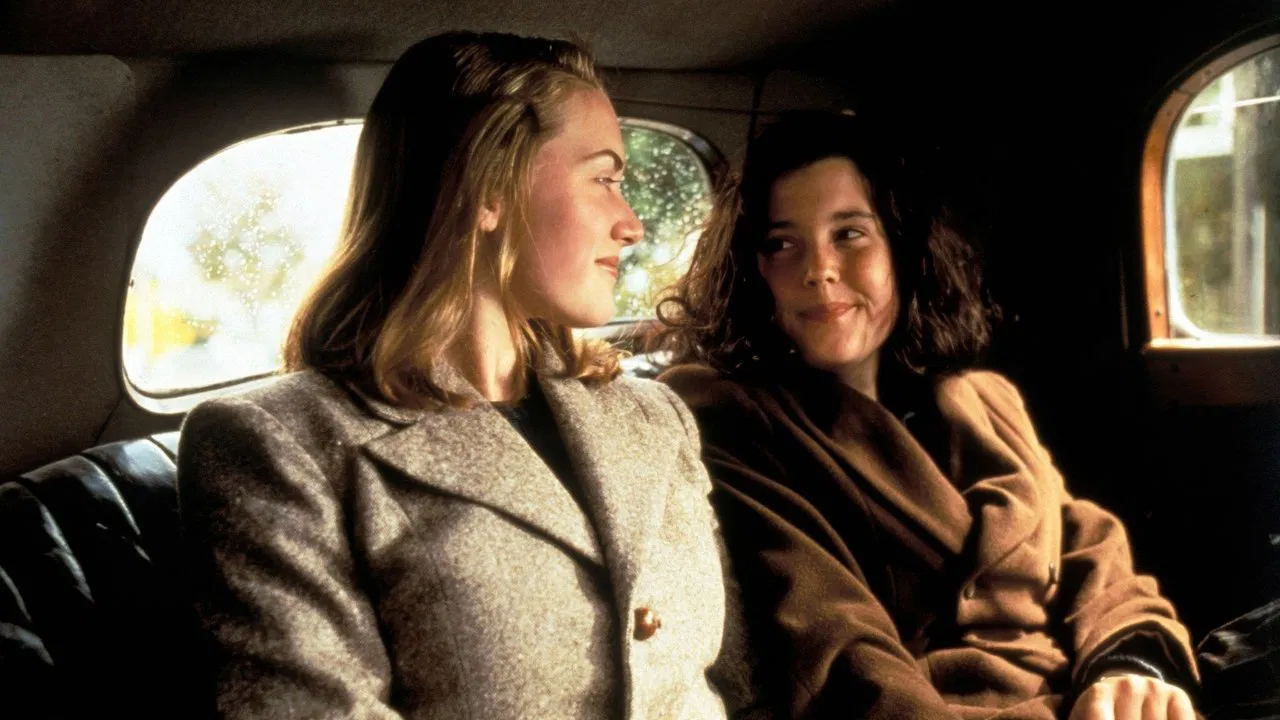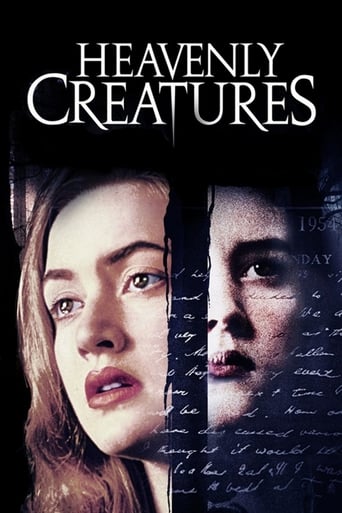

I like the storyline of this show,it attract me so much
... View Moreif their story seems completely bonkers, almost like a feverish work of fiction, you ain't heard nothing yet.
... View MoreIf you like to be scared, if you like to laugh, and if you like to learn a thing or two at the movies, this absolutely cannot be missed.
... View MoreThe film's masterful storytelling did its job. The message was clear. No need to overdo.
... View MoreIn 50's New Zealand, Pauline (Melanie Lynskey) had a rare bone disease as a child, with leg scars. She has no friends at an exclusive girls' school, which her struggling parents can barely afford. They take in boarders, for Pauline is bright. One momentous day, Paul's class gets a new student, imaginative Juliet (Kate Winslet), who is wealthy, intelligent, creative and outspoken. Because Juliet, too, has weak lungs and spent 5 years separated from her family in a warmer climate, the girls have a bond that begins a close friendship. Both girls love Mario Lanza and play-acting. In fact, they envision their own special heaven called The Fourth World, which has knights, princesses, and an elaborate landscape. Both the well-to-do family of Juliet and the poor one of Pauline are extremely concerned about the closer-than-close ties between the two girls. There are other family secrets afoot, too, which eventually result in Juliet's family planning to move away and in Pauline's mother taking steps to separate the girls. But, this results in a tragedy beyond comprehension for two young ladies driven into madness by their own imaginations and strong wills. This amazing film is one for the ages. Not only are the two young performers, Winslet and Lynskey, touching and horrifying beyond their years. but the creative landscapes, real and imagined, are superlative. Also fine are the supporting cast, the tantalizing script (based on true events), and the superb direction by Jackson. Don't miss this heavenly and hellish journey into New Zealand's most notorious crime of the twentieth century.
... View MoreThis film is about real-life teenage friends Pauline Parker and Juliet Hulme in New Zealand in the 1950s.Kate Winslet and Melanie Lynskey are excellent as the friends who are suspected by their parents of being a lesbian couple and who react very badly to being separated. This is Winslet's best performance.
... View MoreThis is a fantasy fable, even though it is based on real events. The movie did bore me for a while in the middle, as the story became somewhat stagnant. The acting is superlative however. The dream sequences are masterfully done. The relationship between Pauline and Juliet is the pivot of the film, a pivot well crafted. Melanie Lynsky paints the brooding, intense portrait of Pauline, an awkward girl with a fluttering heart. Kate Winslet effortlessly plays her debut role of a carefree and emotional teenager. The movie is somewhat stretched out in the middle, and that is why I am rating it a notch low. It is a good film however, and definitely worth a one-time watch.
... View MoreKate Winslet is Juliet Hulme, a bright eyed schoolgirl with golden locks, a radiant smile, and a British accent that makes her stunningly exotic, or at least to the strictly Catholic New Zealand school. Melanie Lynskey is Pauline Parker, whose hair is almost as dark as her glare, and whom no doubt wishes she could exchange her thick New Zealand accent for something a bit striking and otherworldly. These are two girls who would not normally be drawn to each other, but because of medical conditions, find themselves a close friendship. Jackson indicates the blossoming of this by letting the debut actresses act, and be teenage girls; after the first conversation, Paul hurries home, dodging her mother's question to put on a new record - Mario Lanza, the world's greatest tenor, and her blissful reaction is all we need to know. They are both terrific performances and scream children instead of actresses reading lines in each little symptom of girls lost in their own worlds; the mocking tones in which Juliet mimics a 'friend' of her mother's, the way Paul drops her head into her hands whenever she is embarrassed by her father singing into a fish or her mother welcoming a boarder, how they skip together hand in hand and giggle and laugh endlessly in their own imagination. The visual effects, which are noticeably dated, seem to fit quite well with the context. When they first visualise the Fourth World, the mundane New Zealand is physically wiped away in swathes for the idyllic gardens and unicorns and giant butterflies, and a golden glow bathes their playtime. It does not look fluid or smooth, but transforms itself in the same way in which a child's mind unlocks little segments of their daydreams. The soundtrack tinkles along, Mario Lanza serenades, and the camera weaves and swoops its way through the air like the outstretched arms that they have exchanged for aeroplane wings, and swivels around in excitement. A show-tune could easily be dropped in here, and the whole scene could insert itself into Mary Poppins without a touch of difference. When they build a sandcastle, they lovingly craft intricate details and a storyline to match, and the camera makes itself tiny and matches each gallop of the sound design as it tours the majestic building, matching their vivid imagination. Only later, as the Fourth World leaks into the real, does the sound become more menacing; as irritations are beheaded and gutted for upsetting the creator. Aside from those bursts of imaginative violence (which all of us have had once in a while, even as adults - but this films takes it further), Jackson subtly imbues the real world with a haunting, suffocating quality, as if the girl's dreamland has begun to affect how they see reality, and how little they want to return to it. When a pastor offers up a pamphlet emblazoned with Jesus, there is a loud whoosh, dramatising how horrifying this confrontation must be, before a clay figure drags him away for execution. An extreme closeup likewise does the same to evil word the doctor theorises, a taboo back in the 50s. But I think it is much more than just physical love that they share; it is something much stronger. When Paul goes in search of the latter, the camera hovers over a backyard full of junk, and she is presented, climbed the railing, as some sort of prince to a Rapunzel, or a Romeo to a Juliet, in search of that romance in vain. That search leads her back to Juliet, who descends the staircase while the score crescendos in a gown and manner gracefully reminiscent of Cinderella, and Paul's face is awash with a sensual red glow. Harsh green light seems to constantly leak in through the windows, creating a sickly aura that seems to chase the girls and wind down the time they have together. When they are in separate beds, Selkirk hovers over the back of a nurse and smoothly connects the pair through their letters, and then the red and blue glows merge into each other so gorgeously, and they spend the night. All the while, Paul's diary voice-over narrates, and gives us insight into this relationship. It covers every thing from the childhood trivialities to the passionate moments, and is spoken with such a haughty distaste for the real and a wondrous longing for the imaginary. It almost seems normal and consequential when those shocking words are finally dropped: remove mother. This is the film's crowning achievement: to immerse us into Paul and Juliet's world, to make it so seductive, to make themselves so unconditionally necessary to each other, and then to slip in something so trivial, like murder. And it almost manages to convince us it is justified.
... View More